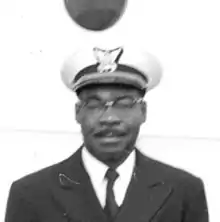Oliver Henry (USCG)
Oliver Henry was a sailor in the United States Coast Guard.[1][2] He started serving in the Coast Guard in 1940, as a mess steward, when the United States Armed Forces were still racially segregated.[3] He was the first black sailor to transfer from the mess steward occupational class. He was transferred to the motor machinist mate occupational class - related to his pre-service work as an auto mechanic.
Oliver Henry | |
|---|---|
 Warrant Officer Oliver Henry in 1952. | |
| Born | 1921 |
| Died | 1987 (aged 65–66) |
| Nationality | USA |
| Other names | Oliver Tony Henry Jr. |
| Occupation | mechanic, sailor, administrator |
| Known for | U.S. Coast Guard's first black motor machinist mate |
Personal life
Henry was born in 1921, in Winterville, North Carolina.[3] After his high school graduation he worked as a auto mechanic, until he enlisted in the Coast Guard, in 1940.
Henry married in the 1950s, and his daughter, Jo-Ann, married the first black graduate of the U.S. Coast Guard Academy, Merle J. Smith.[3][4]
Coast Guard career
After completing basic training he worked as a mess steward aboard the USCGC Manhattan and the USCGC Champlain.[3] William Thiesen, a Coast Guard historian, noted that during segregation, when all black sailors served as mess stewards, mess stewards could not be promoted to petty officer rank.
In 1941 Henry was transferred to the USCGC Northland, and it was during the four years he served aboard the Northland that Henry became the Coast Guard's first black machinist mate.[3] In 1942, when the Northland's executive officer, Lieutenant Commander Carlton Skinner, recommended transferring Henry to the engineering division, submitting test results, showing he had excellent qualifications, bureaucrats in the Coast Guard's personnel administration, turned down the request because he was "colored". Skinner appealed, and Henry was transferred.
Henry rose quickly through the ranks on the Northland, being promoted to chief petty officer in late 1943.[3]
Henry would serve on seven more cutters, after World War II, including the USCGC Mackinac.[3]
In 1950 Henry was promoted to warrant officer, and would rise through the warrant officer ranks.[3] Late in his career he served on the Coast Guard's Member Auditing Board and Member Training Board.
Maritime Administration career
Following his career in the Coast Guard Henry joined the U.S. Maritime Administration.[3] When he retired in 1986 he was deputy director of the administration's Southern California office.
Legacy
In 2010, Master Chief Petty Officer of the Coast Guard Charles "Skip" W. Bowen, proposed that all the cutters in the Sentinel class should be named after enlisted Coast Guardsmen, or one of its precursor services, who were recognized for their heroism, or who otherwise represented a model of service that should be emulated.[5][6][7] In 2018 the Coast Guard announced Henry would be the namesake of the 40th Sentinel class cutter, USCGC Oliver Henry.
When the Oliver Henry is stationed at its home port of Santa Rita, Guam, it will be at a maintenance facility named after his mentor, Carlton Skinner.[8]
Henry's descendants will attend the commissioning of the USCGC Oliver Henry.[9]
References
-
"Stories that Matter: Barrier Breakers Oliver Henry and LTCDR Carlton Skinner". US Coast Guard.
Eighty years ago, in 1940, after working several years as an auto mechanic, Henry enlisted in the U.S. Coast Guard at the Baltimore recruiting office.
-
"Coast Guard breaks ground on FRC support building honoring civil rights trailblazer". Santa Rita, Guam. 2019-07-28.
Oliver Henry is recognized as the first African-American to successfully make the transfer from steward’s mate to motor machinist’s mate and may very well have been the steward’s mate Skinner had referred to in his interview as they both served aboard the Northland together during the Greenland Patrol.
- William Thiesen. "Oliver Henry - Warrior, Leader, Trailblazer". Maritime Executive.
- Jean E. Henry (October 1998). "Letters". Ebony magazine. p. 14. Retrieved 2020-07-25.
-
Susan Schept (2010-03-22). "Enlisted heroes honored". United States Coast Guard. Archived from the original on 2011-12-03. Retrieved 2013-02-01.
After the passing of several well-known Coast Guard heroes last year, Master Chief Petty Officer of the Coast Guard Charles "Skip" Bowen mentioned in his blog that the Coast Guard does not do enough to honor its fallen heroes.
-
"U.S. Coast Guard announces name for first Sentinel-class cutter". 2010-03-22. Archived from the original on 2010-03-25. Retrieved 2013-02-01.
Previously designated to be named the Coast Guard Cutter Sentinel, the cutter Bernard C. Webber will be the first of the service's new 153-foot patrol cutters. Coast Guard Commandant Admiral Thad Allen approved the change of the cutter's name to allow this class of vessels to be named after outstanding enlisted members who demonstrated exceptional heroism in the line of duty. This will be the first class of cutters to be named exclusively for enlisted members of the Coast Guard and its predecessor services.
-
"FRC Plan B: The Sentinel Class". Defense Industry Daily. 2014-05-02. Archived from the original on 2014-07-07. Retrieved 2014-04-03.
All of these boats will be named after enlisted Coast Guard heroes, who distinguished themselves in USCG or military service. The first 25 have been named, but only 8 have been commissioned...
-
Matthew West (2019-07-26). "Honoring Cmdr. Carlton Skinner: a trailblazer for civil rights in the Coast Guard". Dvidshub. Retrieved 2020-07-25.
Oliver Henry is recognized as the first African-American to successfully make the transfer from steward's mate to motor machinist's mate and may very well have been the steward's mate Skinner had referred to in his interview as they both served aboard the Northland together during the Greenland Patrol.
-
"Coast Guard Accepts Newest Fast Response Cutter". Military Spot. 2020-08-06. Retrieved 2020-08-06.
Oliver Henry’s descendants attended the acceptance ceremony virtually and in person at CG Sector Key West. “He not only served with distinction, but he mentored and inspired so many people,” Coast Guard veteran Justin Cardoza said of his grandfather.